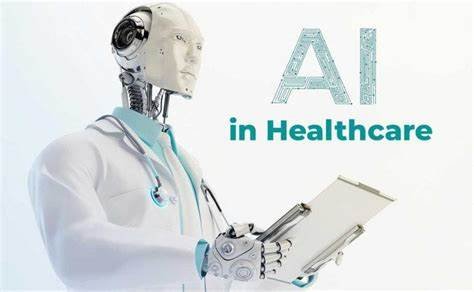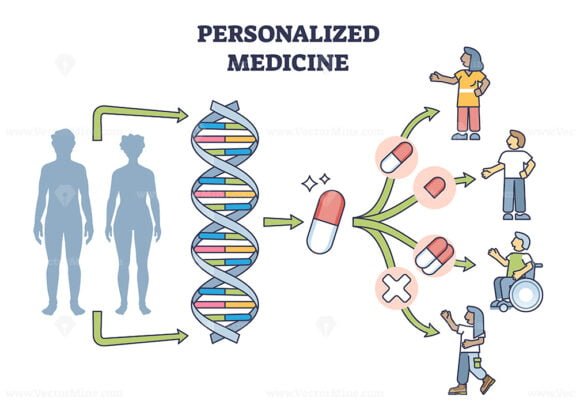
Introduction to Personalized Health Recommendations
Personalized health recommendations have emerged as a transformative approach within the healthcare landscape, focusing on tailored health solutions that address the unique needs of individuals. This concept involves the utilization of advanced technologies and data analytics to create customized health plans that cater not only to specific medical conditions but also to lifestyle preferences, genetic predispositions, and environmental factors. Unlike traditional one-size-fits-all healthcare strategies, personalized health recommendations seek to enhance an individual’s overall wellness through a more individualized lens.
The significance of tailored health care solutions cannot be overstated. By leveraging data from various sources such as genetic testing, wearable health devices, and personalized health assessments, healthcare providers can formulate specific guidelines that resonate with an individual’s unique health profile. This facilitates a more adaptive and responsive health care environment, where interventions are closely aligned with personal health goals and requirements. For example, an individual who is predisposed to heart disease may receive bespoke advice about dietary changes, exercise regimens, and preventive screenings tailored specifically to mitigate their risks.
Moreover, personalized health recommendations play a crucial role in preventing health issues before they arise. By identifying potential risks early through predictive analytics, individuals can engage in proactive measures that foster healthier lifestyles and ultimately reduce the incidence of chronic diseases. This enhances patient engagement, as individuals are more likely to be invested in their health when they see aspects of their personalized health plan correspond directly to their life experiences and choices.
In essence, personalized health recommendations embody a progressive shift in how healthcare is delivered, aiming not only for effective treatment but also for holistic well-being. Through the integration of technology and comprehensive health data, these recommendations signal a promising evolution towards a more effective and engaged health care system.
The Role of Technological Advancements in Health Care
The intersection of technology and health care has continuously evolved, revolutionizing the manner in which services are delivered. Advancements in health technology have led to the emergence of numerous tools and methods that facilitate personalized care, illustrating a profound shift from traditional practices to a more patient-centered approach. Digital innovations, such as telemedicine, wearable health devices, and artificial intelligence, have become integral components in health care delivery, allowing for a myriad of unprecedented possibilities.
Telemedicine exemplifies this shift by enabling remote consultations, thereby providing patients with access to health care professionals without the need for physical visits. This technology has proven especially valuable for individuals in geographically isolated areas or those with mobility limitations. Moreover, telemedicine fosters continuous communication between patients and providers, leading to more timely and tailored health management.
Wearable technology, which includes devices like fitness trackers and smartwatches, has further transformed health monitoring. These devices allow users to track vital signs, exercise patterns, and even sleep quality, generating valuable data that can be shared with health care providers. The insights gleaned from this data facilitate more informed health decisions and interventions, aligning with the principles of personalized health care.
Artificial intelligence (AI) plays a pivotal role by analyzing vast amounts of medical data to predict outcomes, suggest diagnoses, and recommend treatments tailored to individual patients. Machine learning algorithms can identify patterns within data that may not be evident to human practitioners, enhancing the accuracy of personalized care. For instance, AI can help in identifying at-risk individuals for chronic diseases based on genetic predispositions and lifestyle factors.
In conclusion, technological advancements are reshaping health care by promoting personalized and efficient delivery methods. By leveraging telemedicine, wearables, and AI, the health care system is transitioning towards a model that prioritizes individualized patient needs, ultimately enhancing health outcomes.
Wearable Technology: The Future of Health Monitoring
The advancements in wearable technology have significantly transformed the landscape of health monitoring. With an increasing number of companies entering the market, these devices now encompass a wide range of functionalities, from tracking physical activity to monitoring vital signs such as heart rate and oxygen saturation. As these technologies evolve, they are enabling consumers to take a proactive approach towards their health management.
Wearable devices, such as smartwatches and fitness trackers, are equipped with sensors that gather real-time data about an individual’s health metrics. This data is then analyzed to provide personalized insights that can lead to tailored fitness and wellness plans. For instance, these wearables can assess activity levels, sleep patterns, and even stress indicators. By leveraging this information, users can receive customized recommendations aimed at improving their overall health.
An important aspect of wearable technology is its ability to enhance personalized healthcare solutions. Through continuous monitoring, these devices can help identify trends and patterns that inform users about their health status. This personalized feedback is crucial as it empowers users to make informed decisions regarding their lifestyle choices, dietary habits, and exercise routines. By responding to their individual needs, wearable technology promotes a more individualized approach to health management.
Moreover, the integration of artificial intelligence in wearable devices fosters an even greater degree of personalization. AI algorithms can synthesize data collected over time, predicting potential health risks and suggesting preventive measures. Consequently, the role of wearable technology goes beyond mere tracking; it becomes an essential tool for fostering long-term wellness and reducing the need for costly medical interventions.
In summary, the growth of wearable technology signifies a pivotal shift towards a future where health monitoring is not only accessible but also tailored to the unique needs of each individual. With the potential to revolutionize personalized health recommendations, these devices are set to play an integral role in the pursuit of optimized health outcomes.
Artificial Intelligence and Machine Learning in Personalized Health
The integration of artificial intelligence (AI) and machine learning (ML) into the healthcare landscape is fostering a paradigm shift in how personalized health recommendations are developed and executed. These technologies harness vast amounts of health data, including genetic information, medical histories, lifestyle choices, and environmental factors, to generate tailored health strategies for individuals.
By employing sophisticated algorithms, AI systems are capable of identifying patterns and correlations within this diverse data set. This allows for an in-depth understanding of an individual’s health needs, enabling healthcare providers to offer personalized advice that aligns with specific health goals. For instance, machine learning models can analyze data collected from wearable health devices, which continuously monitor physical activity, heart rate, and sleep patterns. This data is processed to deliver actionable insights that encourage healthier behavior and optimize wellness.
Moreover, AI-driven platforms can simulate various health scenarios, predicting outcomes based on different lifestyle choices. For example, if an individual aims to lower their cholesterol levels, AI can analyze their dietary habits and exercise routines, providing personalized recommendations tailored to their unique biochemical responses. Such customized health advice is more effective than generic recommendations, as it resonates better with the individual’s circumstances.
The evolving role of artificial intelligence and machine learning in healthcare offers significant potential for improving health outcomes. It empowers patients by equipping them with knowledge about their health, promoting engagement in their wellness journeys. As technology continues to advance, the capability of AI and ML to refine personalized health recommendations will likely become increasingly sophisticated, bridging the gap between complex health data and actionable advice that benefits individuals on a large scale.
Telehealth: Bringing Health Care to Your Fingertips
In recent years, telehealth has emerged as a transformative force in the delivery of personalized healthcare. By integrating technology into health care frameworks, telehealth facilitates remote consultations and virtual health services, allowing individuals to access tailored medical advice from the comfort of their homes. This innovation eliminates geographical barriers, enabling patients who live in remote or underserved areas to connect with healthcare professionals easily.
One of the primary advantages of telehealth is its capacity to provide personalized health recommendations. Through video calls, patients can discuss their medical history and current health concerns directly with specialists, who can then offer customized treatment plans based on individual needs. As a result, patients receive timely interventions that can significantly enhance their health outcomes. Additionally, telehealth platforms often utilize algorithms and data analytics to further refine these recommendations, ensuring they are as precise as possible.
Moreover, telehealth promotes continuous patient monitoring. Healthcare providers can utilize wearable devices to gather real-time data on patients’ vital signs and overall health status. This data not only aids in adjusting treatment plans promptly but also empowers patients to take an active role in their health management. Patients can receive reminders for medication, exercise, and other health-related tasks that contribute to their personalized health journeys.
Furthermore, telehealth encourages a more holistic approach to care by incorporating mental health services alongside traditional medical practices. Individuals can access mental health professionals through telehealth, enabling a more comprehensive strategy for their overall well-being. Consequently, patients benefit from an integrated care model that addresses both physical and mental health in a unique and personalized manner.
In conclusion, the integration of telehealth within personalized healthcare frameworks offers significant advantages in accessing tailored medical recommendations and interventions. As technology continues to advance, telehealth will likely play an increasingly central role in how individuals manage their health, ensuring they receive the care they need, when they need it.
The Importance of Data Security in Personalized Health Care
In the realm of personalized health care, the collection and processing of personal health information (PHI) have become increasingly reliant on technological advancements. However, the integration of technology into health care raises critical concerns regarding data security and privacy. The sensitivity of health information necessitates stringent security measures to protect users from potential breaches and unauthorized access. As health data is being utilized to tailor specific treatment plans and health recommendations, the importance of maintaining confidentiality cannot be overstated.
Challenges in data security are manifold; cyberattacks targeting health care databases have become more prevalent, compromising patient confidentiality and trust. The risks of data breaches lead to significant consequences, not only for individuals whose information may be misused but also for healthcare organizations that face regulatory penalties and reputational damage. Furthermore, as technologies evolve, so do the tactics employed by cybercriminals, illustrating a perpetual battle between healthcare providers and security threats.
To mitigate these risks, healthcare organizations must adopt comprehensive data security practices. Implementing robust encryption methods, secure access controls, and regular audits of information systems are essential steps to safeguard sensitive health information. Furthermore, educating employees on best practices and emerging threats can empower them to recognize and counteract risks effectively. Additionally, compliance with regulations such as the Health Insurance Portability and Accountability Act (HIPAA) in the United States serves as a foundational framework to uphold data protection standards in personalized health care.
Ultimately, ensuring the security of personal health data allows for the effective utilization of technology in delivering personalized health recommendations without jeopardizing individual privacy. Health care providers must prioritize data security to foster a trustworthy environment that embraces technological advancements, thus facilitating the growth of personalized health care solutions that benefit all stakeholders involved.
Budget-Friendly Health Solutions: Quietum Plus Supplements
In the quest for maintaining optimal health, individuals often encounter the challenge of balancing wellness with financial constraints. Quietum Plus supplements emerge as a viable option, offering an affordable means for enhancing overall health. These supplements are designed to support a healthy lifestyle, assisting users in achieving their fitness goals and adhering to dietary plans without straining their budgets.
One of the key aspects of Quietum Plus supplements is their formulation, which aims to provide essential nutrients that the body may lack due to various factors, including diet or lifestyle. The supplements are crafted using natural ingredients, making them a suitable choice for those who prioritize holistic health solutions. The focus on natural components not only aligns with current wellness trends but also helps to minimize adverse side effects often associated with synthetic alternatives.
The role of Quietum Plus supplements in promoting fitness cannot be overstated. By providing the body with necessary vitamins and minerals, these supplements can enhance energy levels, support metabolic processes, and improve overall well-being. This added vitality empowers individuals to participate in physical activities more effectively, contributing to weight management and overall health. Furthermore, the affordability of these supplements makes them accessible to a larger audience, ensuring that health and fitness are attainable goals regardless of one’s financial situation.
Incorporating Quietum Plus into a daily routine elevates the commitment to health, forming a cornerstone for sustainable living. By encouraging healthier practices while remaining budget-conscious, these supplements serve as a practical option for those seeking to enhance their wellness journey. Emphasizing a balanced approach to health can lead to meaningful transformations that are both economical and effective.
Case Studies: Successful Implementation of Personalized Health Care
In recent years, the integration of technology into personalized health care has demonstrated notable improvements in patient outcomes and satisfaction. Several case studies exemplify the positive impact of tailored health recommendations driven by data analytics, wearable devices, and artificial intelligence. One prominent example is the use of genetic testing by companies like 23andMe, which provides customers with tailored dietary, fitness, and health risk insights based on their genetic makeup. These personalized recommendations enable individuals to take proactive measures in their wellness journeys, fostering a greater sense of agency over their health. The results have illustrated reduced predisposition to specific conditions through lifestyle changes, improving user engagement and satisfaction.
Similarly, the implementation of wearable health technology, such as continuous glucose monitors (CGMs), has transformed how individuals with diabetes manage their condition. Companies like Dexcom and Abbott have successfully developed devices that provide real-time glucose monitoring coupled with personalized insights for dietary and activity adjustments. This real-time feedback empowers patients to make informed dietary choices, ultimately leading to improved glycemic control and enhanced overall well-being. Studies indicate that users of CGMs report higher satisfaction levels and a greater sense of control over their health compared to traditional monitoring methods.
Telehealth platforms, too, have played a crucial role in the successful deployment of personalized health care recommendations. For instance, the partnership between Teladoc Health and various health systems has enabled the remote delivery of tailored health plans. Patients can receive personalized care based on their unique health profiles through these platforms, resulting in improved adherence to treatment protocols and enhanced patient experience. Testimonials from participants indicate that customized care paths significantly elevate their confidence in managing their health, showcasing that technology is an undeniably effective tool in the pursuit of personalized health recommendations.
The Future of Personalized Health Recommendations
As we look toward the future of personalized health recommendations, it becomes increasingly evident that technological advancements will play a pivotal role in shaping the landscape of healthcare. The integration of artificial intelligence (AI) and machine learning into healthcare systems is likely to revolutionize how recommendations are generated and tailored to individual patients. By harnessing vast amounts of data from various sources, including genetic information, lifestyle choices, and even environmental factors, AI algorithms can provide actionable insights that are customized to meet the unique needs of each patient.
Additionally, the rise of wearable health technologies, such as smartwatches and fitness trackers, is contributing to a more personalized healthcare experience. These devices continuously collect a plethora of health data, allowing for real-time monitoring and feedback. In the future, it is plausible that these wearables will integrate seamlessly with healthcare systems, enabling proactive health management and personalized recommendations based on an individual’s specific health status and activity levels.
Telemedicine and digital health platforms are also set to become more sophisticated, offering tailored experiences that cater to diverse patient populations. Through the use of advanced analytics, healthcare providers can better understand patient histories and preferences, ultimately leading to personalized health plans that adapt to changing circumstances over time. Moreover, the ongoing development of personalized medicine, including targeted therapies and precision nutrition, will further highlight the importance of customization in healthcare.
As we navigate these advancements, ethical considerations will be paramount. Ensuring patient privacy and data security will be crucial as personalized health recommendations become increasingly reliant on sensitive health information. By addressing these concerns, the future of personalized health recommendations has the potential to enhance patient outcomes significantly while empowering individuals to take charge of their health more intelligently and effectively.




